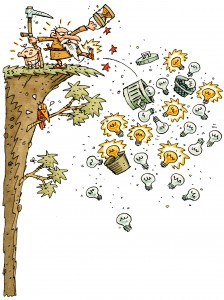Here are some concepts you might consider tossing out with the Christmas wrappings as you get started on the new year: human nature, cause and effect, the theory of everything, free will and evidence-based medicine.
Those are only a few of the shibboleths, pillars of modern thought or delusions — take your choice — that appear in a new compendium of essays by 166 (and counting) deep thinkers, scientists, writers, blowhards (again, take your choice) as answers to the question: What scientific idea is ready for retirement?
The discussion is posted at edge.org. Take a look. No matter who you are, you are bound to find something that will drive you crazy.
Some are boldface names in the pop-science firmament, like Freeman Dyson, the mathematician and futurist at the Institute for Advanced Study; Steven Pinker, the best-selling linguist from Harvard; Richard Dawkins, the evolutionary biologist and best-selling atheist from Oxford University; and Mihaly Csikszentmihalyi, the psychologist who invented the notion of flow, or being completely lost in what you are doing, and who says scientists need to let go of the idea that the truths they find are good for all time and place.
Professor Dawkins and Lisa Feldman Barrett, a psychologist from Northeastern University, both attack the concept of essentialism, which holds that things like dogs and cats, triangles and trees, space and time, emotions and thoughts — all have an underlying essence that makes them what they are. This works great in math, Professor Dawkins argues, but is a disaster when applied to species or politics, disallowing the possibility of change or gradation.
Read the full article discussing Edge.org‘s annual question, “What scientific idea is ready for retirement?,” featuring CLBB faculty Lisa Feldman Barrett, in the New York Times. By Dennis Overbye; published January 14, 2014. Feldman Barrett’s response to the annual question can be found here.




